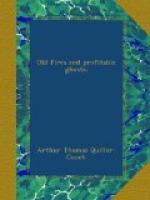Parson West, then, when I made his acquaintance in 188-, had for thirty years been vicar of the coast-parish of Lansulyan. He had come to it almost fresh from Oxford, a young scholar with a head full of Greek, having accepted the living from his old college as a step towards preferment. He was never to be offered another. Lansulyan parish is a wide one in acreage, and the stipend exiguous even for a bachelor. From the first the Parson eked out his income by preparing small annotated editions of the Classics for the use of Schools and by taking occasional pupils, of whom in 188- I was the latest. He could not teach me scholarship, which is a habit of mind; but he could, and in the end did, teach me how to win a scholarship, which is a sum of money paid annually. I have therefore a practical reason for thinking of him with gratitude: and I believe he liked me, while despising my Latinity and discommending my precociousness with tobacco.
His pupils could never complain of distraction. The church-town—a single street of cottages winding round a knoll of elms which hide the Vicarage and all but the spire of St. Julian’s Church—stands high and a mile back from the coast, and looks straight upon the Menawhidden reef, a fringe of toothed rocks lying parallel with the shore and half a mile distant from it. This reef forms a breakwater for a small inlet where the coombe which runs below Lansulyan meets the sea. Follow the road downhill from the church-town and along the coombe, and you come to a white-washed fishing haven, with a life-boat house and short sea-wall. The Porth is its only name. On the whole, if one has to live in Lansulyan parish the Porth is gayer than the church-town, where from the Vicarage windows you look through the trees southward upon ships moving up or down Channel in the blue distance and the white water girdling Menawhidden; northward upon downs where herds of ponies wander at will between the treeless farms, and a dun-coloured British earthwork tops the high sky-line. Dwellers among these uplands, wringing their livelihood from the obstinate soil by labour which never slackens, year in and year out, from Monday morning to Saturday night, are properly despised by the inhabitants of the Porth, who sit half their time mending nets, cultivating the social graces, and waiting for the harvest which they have not sown to come floating past their doors. By consequence, if a farmer wishes to learn the spiciest gossip about his nearest neighbour, he must travel down to the Porth for it.
And this makes it the more marvellous that what I am about to tell, happening as it did at the very gates of the Porth, should have escaped the sharpest eyes in the place.
The Vicar’s custom was to read with me for a couple of hours in the morning and again for an hour and a half before dinner. We had followed this routine rigidly and punctually for three months or so when, one evening in June, he returned from the Porth a good ten minutes late, very hot and dusty, and even so took a turn or two up and down the room with his hands clasped behind his coat-tails before settling down to correct my iambics.




